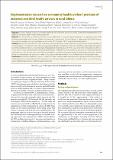Implementation research on community health workers’ provision of maternal and child health services in rural Liberia

View/
Author
Luckow, Peter W
Kenny, Avi
White, Emily
Ballard, Madeleine
Dorr, Lorenzo
Grant, Benjamin
Johnson, Alice
Lorenzen, Breanna
Mukherjee, Subarna
Ly, E John
McDaniel, Abigail
Nowine, Netus
Sathananthan, Vidiya
Sechler, Gerald A
Kraemer, John D
Note: Order does not necessarily reflect citation order of authors.
Published Version
https://doi.org/10.2471/BLT.16.175513Metadata
Show full item recordCitation
Luckow, P. W., A. Kenny, E. White, M. Ballard, L. Dorr, K. Erlandson, B. Grant, et al. 2017. “Implementation research on community health workers’ provision of maternal and child health services in rural Liberia.” Bulletin of the World Health Organization 95 (2): 113-120. doi:10.2471/BLT.16.175513. http://dx.doi.org/10.2471/BLT.16.175513.Abstract
Abstract Objective: To assess changes in the use of essential maternal and child health services in Konobo, Liberia, after implementation of an enhanced community health worker (CHW) programme. Methods: The Liberian Ministry of Health partnered with Last Mile Health, a nongovernmental organization, to implement a pilot CHW programme with enhanced recruitment, training, supervision and compensation. To assess changes in maternal and child health-care use, we conducted repeated cross-sectional cluster surveys before (2012) and after (2015) programme implementation. Findings: Between 2012 and 2015, 54 CHWs, seven peer supervisors and three clinical supervisors were trained to serve a population of 12 127 people in 44 communities. The regression-adjusted percentage of children receiving care from formal care providers increased by 60.1 (95% confidence interval, CI: 51.6 to 68.7) percentage points for diarrhoea, by 30.6 (95% CI: 20.5 to 40.7) for fever and by 51.2 (95% CI: 37.9 to 64.5) for acute respiratory infection. Facility-based delivery increased by 28.2 points (95% CI: 20.3 to 36.1). Facility-based delivery and formal sector care for acute respiratory infection and diarrhoea increased more in agricultural than gold-mining communities. Receipt of one-or-more antenatal care sessions at a health facility and postnatal care within 24 hours of delivery did not change significantly. Conclusion: We identified significant increases in uptake of child and maternal health-care services from formal providers during the pilot CHW programme in remote rural Liberia. Clinic-based services, such as postnatal care, and services in specific settings, such as mining areas, require additional interventions to achieve optimal outcomes.Other Sources
http://www.ncbi.nlm.nih.gov/pmc/articles/PMC5327932/pdf/Terms of Use
This article is made available under the terms and conditions applicable to Other Posted Material, as set forth at http://nrs.harvard.edu/urn-3:HUL.InstRepos:dash.current.terms-of-use#LAACitable link to this page
http://nrs.harvard.edu/urn-3:HUL.InstRepos:32072009
Collections
- HMS Scholarly Articles [17922]
Contact administrator regarding this item (to report mistakes or request changes)


